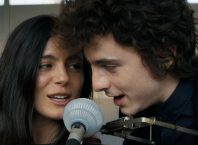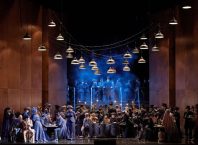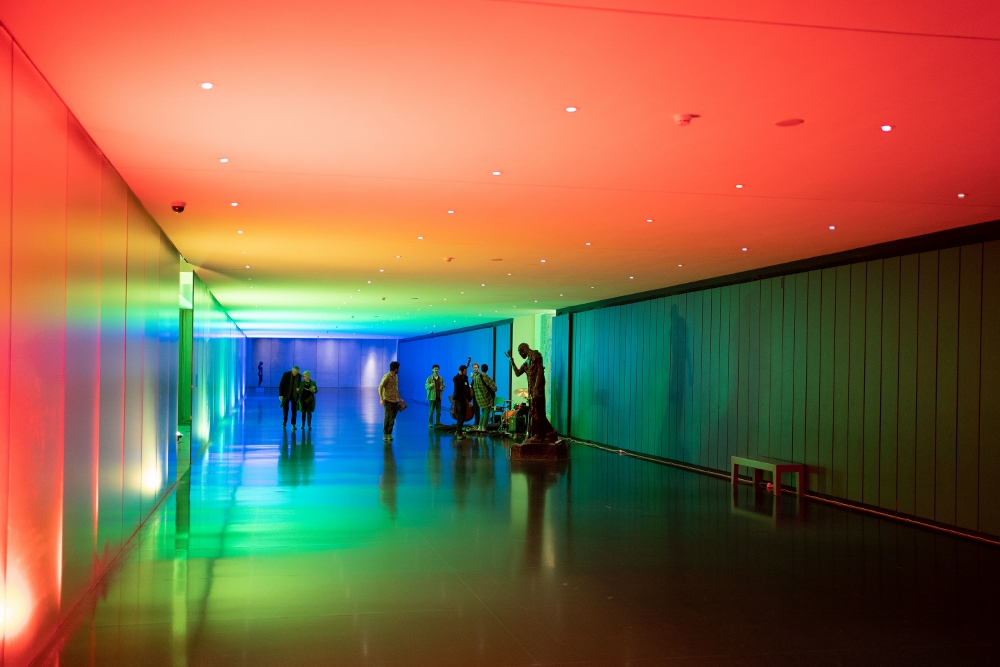
The Jerusalem Jazz Festival is an amazing experience – exhilarating, inspiring, and diverse, with chill flow, fantastic riffs and terrific groove! Now in its 5th edition, the international flagship program of the Israel Festival in cooperation with the Yellow Submarine and the Israel Museum, under the artistic direction of internationally renowned trumpeter Avishai Cohen, the festival presented an eclectic program of stellar musicians for three days of concerts from December 4 – 6, 2019. Yet it is far more than a series of concerts. Set in the museum galleries, the listener is also a viewer, standing amidst history and creativity. Unlike traditional concert settings, the audience is invited to wander from one concert to another, and the people walking through the museum, looking around, talking, and stopping to listen, become part of the event, a human moving sculpture.
Jazz is a genre that is constantly expanding, questioning, and challenging its boundaries, for some, even the term itself is controversial. The Jerusalem Jazz Festival embodies that elusive quality, it has swing, it has flow, it has groove. The festival is music itself, ever moving, ever changing. Accentuating the feeling of spontaneity are the Floating Sounds – solos, duos and trios of the festival musicians who pop up in different locations throughout the museum, to perform a mini-set of improvised music. Opening up new possibilities, the connections created between musicians who do not typically perform together are like sparklers, bright flashes of phrases and feelings. These musical interludes are planned, and timed to occur more or less between concerts – there is even a daily schedule available at the information desk. So yes, you can plan to encounter them, but it is even more fun when you come across them unexpectedly, walking from one gallery to another, hearing music from a distance, and following the sound.
If at all possible, plan to come for all three days of the festival – I did not, and am currently weeping great figurative tears of regret. Here’s why: the rich, abundant program of the festival has so much to offer and happily, some of the concerts repeat, so that if you miss out on a concert one night, you have another opportunity catch it. Or, if you are really enthusiastic about a band, you can hear them again. But mostly – just because it the festival is so wonderful, I wanted it to go on and on and on…
And the brilliant mind of Artistic Director Avishai Cohen has planned for that feeling too, with late night jam sessions taking place at the Yellow Submarine, under the direction of saxophonist Elad Gellert. Wednesday night I was a boring fool, and let the cold air and writing deadlines send me home after the last concert. Thursday night I was older, wiser, and energized after a pep talk from Elad, and headed off to the Yellow Submarine. WOW!!! I really enjoyed the trio who opened Bohuslä the night, even though I didn’t catch their names… but all that followed was just so wild and amazing! Two trios – Shalosh (Gadi Stern – piano, David Michaeli – double bass, Matan Assayag – drums) and Kadawa (Tal Yahalom – guitar, Almog Sharvit – bass, Ben Silashi – drums) – performed together, something fantastic to hear and see, with two drum sets onstage back to back! Then two musicians from the Bohuslän Big Band – Samuel on trumpet and Mikael on saxophone – joined in, followed by Çağrı Sertel on piano, Soweto Kinch on saxophone, and Avishai Cohen on trumpet. I think there were other musicians onstage out of my line of sight, who contributed to the superb sound. Wonderful delirium.
Some impressions from the festival:
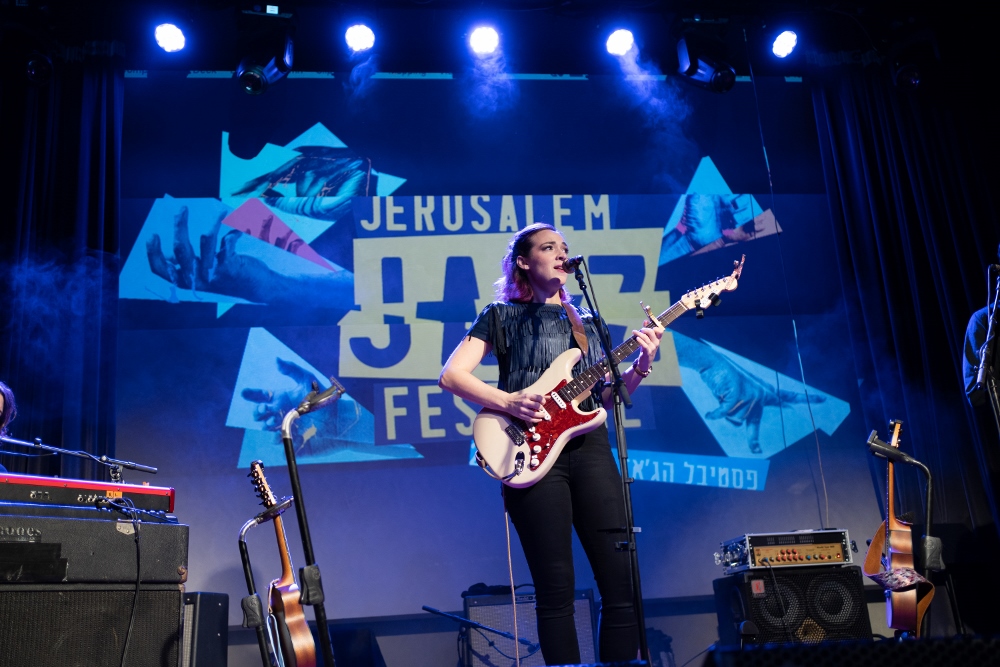
The clear, floating voice of Becca Stevens opened the festival for me, with poetic lyrics and indie-rock and folk-infused sound, accompanied by Michelle Willis on keyboards and Chris Tordini on bass. The set closed with the moving Heather’s Letters to her Mother (from the album Wonderbloom, to be released in March 2020), written for Heather Heyer, who was killed when a car deliberately crashed into a peaceful protest against the Unite the Right rally in Charlottesville, Virginia on August 12, 2017. The entire audience joined in on the chorus: “We’ve got nothing without love and one another” sung in tandem with Becca Stevens singing “This is not the America I know.”
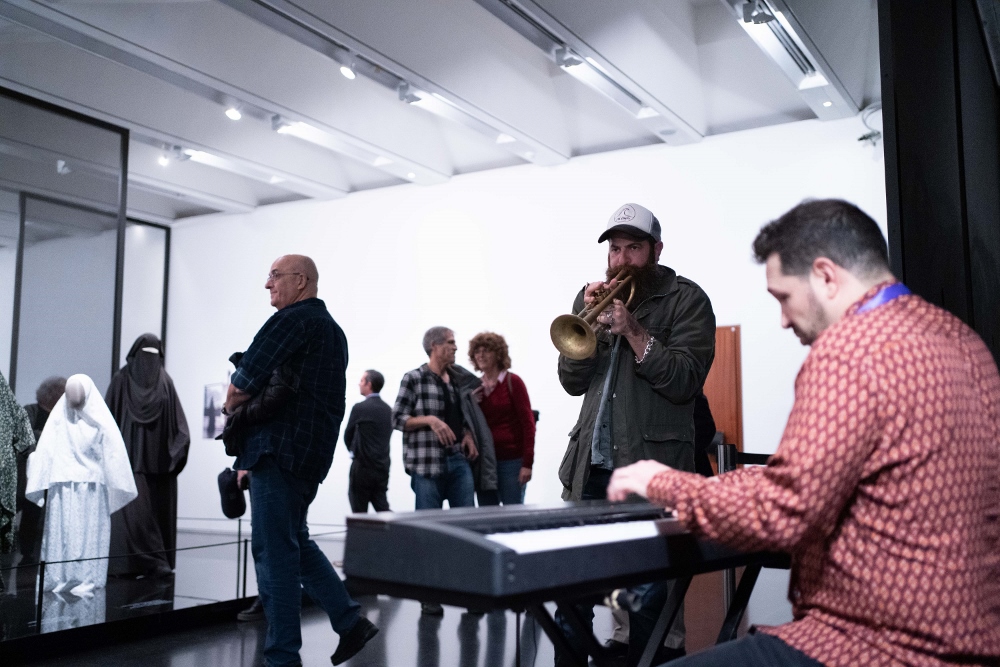
Wandering up the stairs, I found Avishai Cohen on trumpet and Roi Mor on keyboards in an intimate conversation, a breezy musical back and forth in the midst of the Veiled Women exhibit.
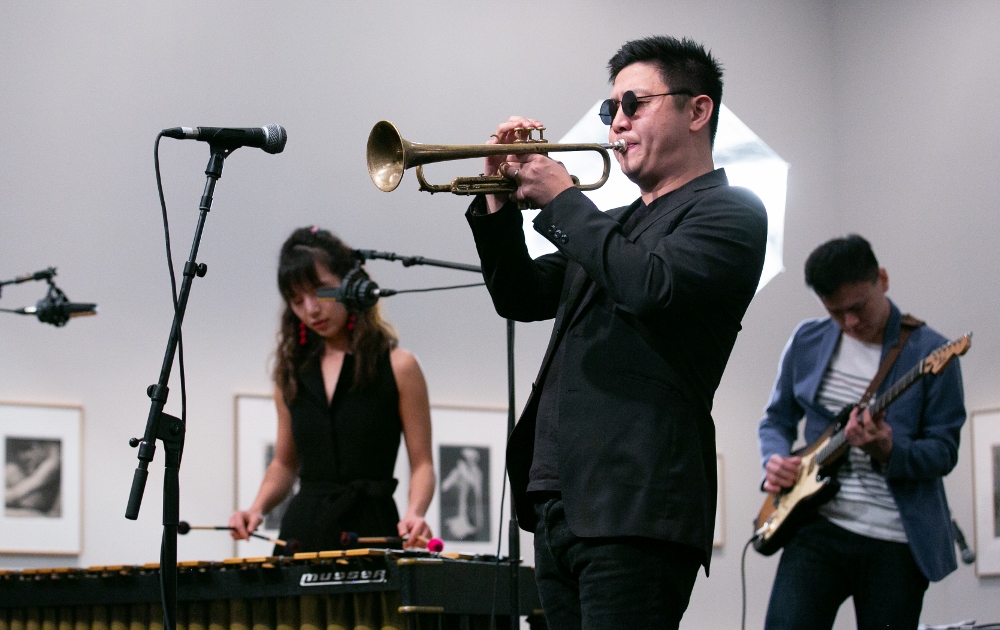
Yet another wonderful discovery awaited me in A Modern Love, an exhibit of photographs from the museum collection, from 1900 – 1945, curated by Noam Gal. The Li Xiaochuan Quintet from China performing in Israel for the very first (but I hope not last) time! Led by Li Xiaochuan on trumpet, with Rong Chenchu on vibraphone, Huang Yong on bass, Zhang Xiongguan on guitar and Xu Zhitong on drums. I remember a piece beginning with a soft electric guitar and the dream-like feel of the vibraphone, a brush of the cymbals, and then the trumpet coming in and the music opening up to a bold sound, rhythmic, free and fast. A great set with engaging melodies, shifting rhythms, and exciting solos.
As I walked out of the gallery I heard a beautiful, undulating voice and followed the sound to where Tamar Bloch sang Moroccan melodies while playing the karabu, accompanied by Jonathan Voltzok on trombone and Matan Assayag on drums.
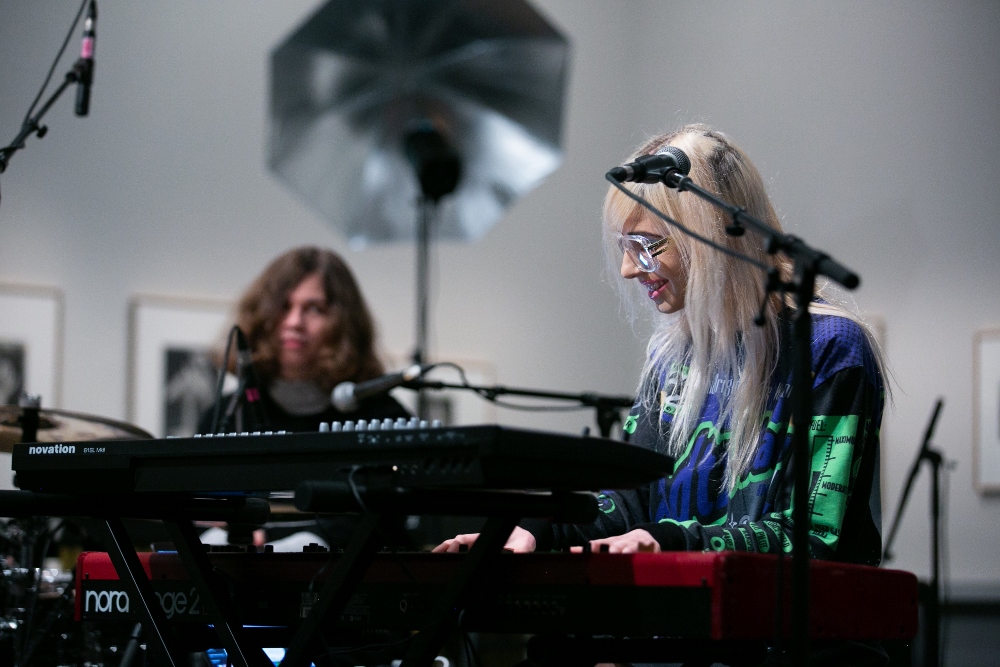
DOMi (Domitille DeGalle) & JD Beck – are a young, very young, drums & keyboard duo hailing from France and Texas, respectively. Their set was met with much enthusiasm as they flew from one piece to another, their musical accomplishment complemented by undercutting commentary, with DOMi saying: “We really don’t know what the hell we’re doing. It’s perfect.” Whether on originals like The Bathroom, or taking the Flintstones out of the stone age with a fun arrangement of the television show’s theme song, JD Beck and DOMi are like vodka popsicles – delicious, irreverent and chill.
Closing my first night at the festival was the very festive fusion of cultures as Nani (Noam Vazana) merged songs influenced by her Ladino-North African roots with the songs and story-telling of South African cellist Abel Selaocoe in the program Both Sides of Africa, with Ayoze de Alejandro on drums, and Pablo Dominguez on guitar. One song featured Vazana’s original composition to a text by 11th century philosopher Shmuel HaNagid, another, an original in Zulu by Abel Selaocoe, originated in the experience of growing up in, and resisting, the oppression of apartheid. Vazana’s sweeping melodies are dramatic and full of feeling, sung in Ladino with a touch of flamenco flair. Selacoe, an expressive cellist, commented that it was “the most unlikely instrument where I come from” and this choice was intentional, as a means for social change, saying “everybody makes an impact… the best way for me to protest was to play the cello.” What a night!
Shalosh – Gadi Stern (piano), David Michaeli (double bass), Matan Assayag (drums) – were superb, endlessly inventive and enchanting. They opened with a piece called Lullaby, a quiet awakening, like a crocus coming through the snow, when things that appear to be sleeping are full of life and wonder, intensifying into the crash of thunder and cascading sound. Back in Town, a song from their upcoming album, had a bright, easy-feeling rhythm, with a sense of chill meandering. The ensemble played several new pieces with titles as inventive as the music – David Bowie Contemplating Death and Art in a Café in Berlin, and Ignore the War. One song, with a futuristic narrative, is so new, they haven’t even settled on a title yet…
Hearing the Bohuslän Big Band from Sweden and Avishai Cohen perform several of Cohen’s originals in new arrangements by trombonist Niclas Rydh and American musician Mike Holober, was a once-in-a-lifetime experience, the kind I’m always hoping for when I go to a music festival. Taking place in the gallery of A Modern Love, the concert was so full that I felt fortunate to find a place to stand with a partial view of the band. The sound was immense and lush, with the fullness of instruments played to perfection, scintillating solos, and a warm rapport among the musicians and with the audience. I wish I could have been there on Friday to hear them again.
Moving on – I arrived at an utterly different musical world and experience as The Great Gehenna Choir performed an original soundtrack to the films of trailblazer Maya Deren. The performance is part of the Yellow Submarine’s new project “She Loves the Cinema!” bringing together the works of women musicians and filmmakers. Taking place in the vast darkness of an exhibit still under construction, the event had the feeling of ritual, with the performers dressed all in white. Deren’s Meditation on Violence (1948) features Chao-Li Chi dancing in nature and in a room, the film alternated in its projection among three screens, and the performers shaped silence into sound, sound into words and song, sound into silence. Later, Deren’s At Land (1944) was accompanied by a wave of motion, as the performers held fans that rose and dipped like the waves.
Trying to capture all I could, I ventured into the performance of the Soweto Kinch Trio, with Soweto Kinch on alto sax, vocals, keys/programming; Nick Jurd on double bass; and Vladimir Kostadinovic on drums for an experience at once abstract and visceral. The captivating performance ended on an energetic, upbeat note, as Soweto spoke of the possibility of “changing the energy of the world” and got us all singing along – more or less on cue, as he rapped: Jazz, Jerusalem.
The Jerusalem Jazz Festival: Executive Director – Eyal Sher; Artistic Director: Avishai Cohen; Producer: Hadas Vanunu.




